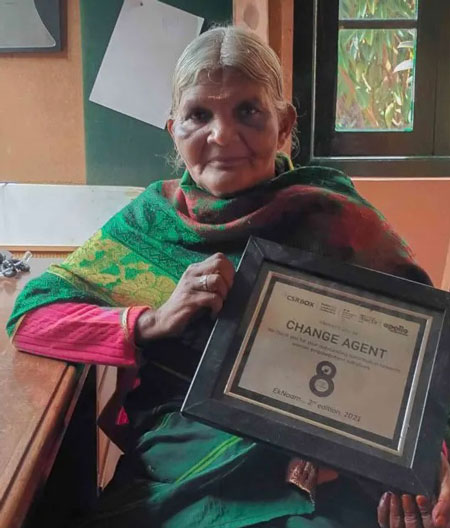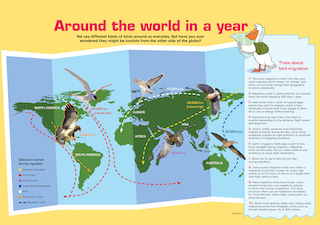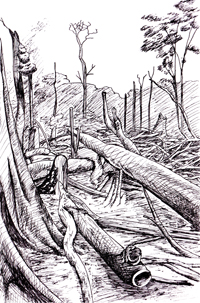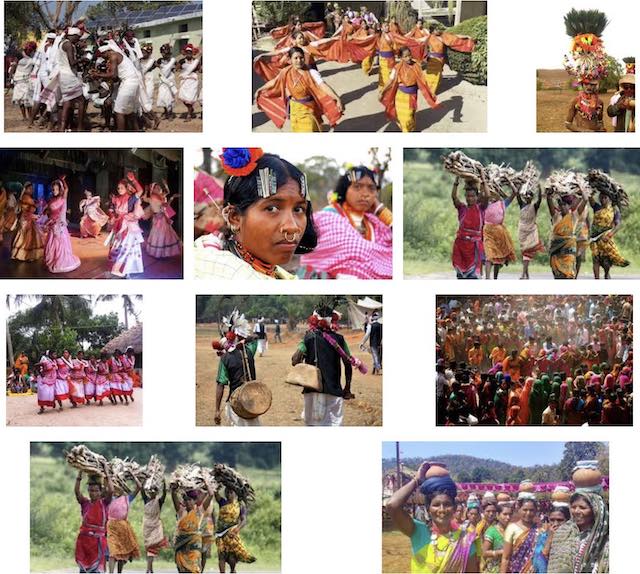
Photo © Arathi Menon
Read the full story with more images >>
Aadhimalai, winner of UN Equator Prize from Nilgiris, offers a lesson in indigenous economics
Traditional healer Janakiamma (60) belongs to the Kurumba community. An indigenous community in south India, Kurumba is listed by the government of India as one of the Particularly Vulnerable Tribal Groups or PVTGs in India. […]
As the discourse around the lifeways of indigenous communities, being appropriated and peddled as nature-based solutions (NbS) in various developed countries, gets louder, the APPCL stands as testimony to the fact that indigenous economics is one of the keys to climate action. Living in symbiosis with nature is the fundamental principle that guides indigenous lives worldwide. Indigenous economics, which has nature as the nucleus and does not treat conservation separately and as detached from other aspects of growth, serves as an antidote to the Western economics that pursues economic goals or “development” at the cost of nature.
Green economy: Tribals as sellers and buyers
“We were recognised under green economy because the tribal communities involved get the produce from the forest which is value-added at the villages itself. Then that goes out to market, and profit returns to the communities. We are not polluting nature or depleting resources, or creating carbon footprints in the process. We are generating economy through green methods,” says Jestin Pauls, the CEO of the APPCL and the only non-tribal staff there. […]
Since honey hunting is a highly skilled job and wild honey is a much-valued produce, the APPCL ensures that the harvesting fully sustainable. When supplying their honey to the company, the honey hunters have to provide details on how many honeycombs they spotted, which cliffs they were on, what flowers and trees were there, and how many honeycombs they harvested. […]
Women empowerment: How tribal women found their voice
The UN Equator Prize also recognises the APPCL’s contribution in women’s empowerment. Pauls says that out of 60 staff of the APPCL, 52 are women. Considering the tribal women are one of the most marginalised in society, Nath admits that it wasn’t easy to achieve this. “We reserved the seats for women and only women,” she says. “The biggest issue initially was that they were not educated. Every step of this enterprise needed them to be involved in calculations like measurements, maintaining records and understanding profit and loss. Initially, we did a lot of capacity building through repeated training. Some competent women like Sumitra and Janakiamma played a crucial role in mobilising women. Then the younger girls who were educated showed up,” says founder Nath. […]
“Our unit is a place for women in the village to sell forest produce like shikakai, amla and silk cotton found fallen on the ground. Men go for work, but the money hardly reaches the woman in most households. Now she can earn by selling these, and these products don’t go waste in the forest as well,” she says. Sumitra feels that in Aadhimalai, tribal women have found their voice. We’ve got anganwadis and schools in our villages, and that’s mainly because of us. When the authorities come to inspect villages, we are always here at the production unit to meet them and tell them what the village needs,” she says with pride. […]
Source: “Aadhimalai, winner of UN Equator Prize from Nilgiris, offers a lesson in indigenous economics” by Arathi Menon (Mongabay Series: Eco Hope, 20 December 2021)
URL: https://india.mongabay.com/2021/12/aadhimalai-winners-of-un-equator-prize-from-nilgiris-offer-a-lesson-in-indigenous-economics
Date Visited: 25 December 2021
Mongabay-India is a nonprofit environment and conservation news platform that brings high-quality, original reports from nature’s frontline in India. We look at India’s development through the prism of environment and conservation. | Learn more >>

Mongabay-India contributors >>
Mongabay-India is a nonprofit environment and conservation news platform that brings high-quality, original reports from nature’s frontline in India. We look at India’s development through the prism of environment and conservation >>
“From transforming barren lands into forests, to practicing planet-friendly organic farming in the backyards, the permaculture movement is led by youngsters who believe in reconnecting with the ancient roots and re-establishing a connect with nature.” – Babli Yadav (Mongabay-India) in India’s permaculture movement is being taken forward by young people >>
More about Biodiversity | Economy and development | Health and nutrition | Success stories | Women >>
The Equator Prize, organized by the Equator Initiative within the United Nations Development Programme, is awarded biennially to recognize outstanding community efforts to reduce poverty through the conservation and sustainable use of biodiversity. As sustainable community initiatives take root throughout the tropics, they are laying the foundation for a global movement of local successes that are collectively making a contribution to achieving the Sustainable Development Goals (SDGs). As local and indigenous groups across the tropics demonstrate and exemplify sustainable development, the Equator Prize shines a spotlight on their efforts by celebrating them on an international stage.
Source: “What’s the Equator Prize?” by the Equator Initiative, Global Programe on Nature for Development
URL: https://www.equatorinitiative.org/equator-prize/
Date Visited: 31 December 2021
We cannot emphasize enough the importance of entrepreneurship. It links job creation, income generation, and innovation in ways that benefit the whole of society. The setbacks experienced during the pandemic by women in particular and economies more generally worldwide make the role of entrepreneurship and programs such as this one all the more important. – Aparna Mehrotra, Director, UN System Coordination Division, UN Women
Source: “WIPO Indigenous and Local Community Entrepreneurship Program Welcomes New Group of Women Entrepreneurs”
URL: https://www.wipo.int/tk/en/news/tk/2021/news_0020.html
Date Visited: 3 January 2022
[Bold typeface added above for emphasis]
Learn more about the tribal communities of the Nilgiri region
Bettakurumba | Kattunayaka | Kurumba |Mullukurumba | Paniya | Toda
More about Scheduled Tribes of Tamil Nadu | Particularly Vulnerable Tribal Groups >>
For additional learning resources visit the website of the Centre for Science and Environment (CSE), “a public interest research and advocacy organisation based in New Delhi”:
Communication for Awareness
CSE’s publications and informational products have been its strength and they have always combined research and readability to get the message across.

CSE’s tools for awareness raising are periodicals, publications, films/short spots, briefing papers, exhibitions, posters and other products. CSE’s informational products reach people in more diverse ways such as features service, website and e-news bulletins. […]
Source: About CSE
URL: https://www.cseindia.org
Date Visited: 10 July 2022

“We can do things differently to reinvent growth without pollution. But only if we have the courage to think differently.” – Sunita Narain in Down To Earth >>
Continents & countries
Up-to-date reports by Indian experts and journalists
Search tips
Combine the name of any particular state, language or region with that of any tribal (Adivasi) community.
Add keywords of special interest (music, poetry, dance just as health, sacred grove and biodiversity); learn about the rights of Scheduled Tribes such as the “Forest Rights Act” (FRA); and the United Nations “Declaration on the Rights of Indigenous Peoples”, “Universal Declaration of Human Rights”, “women’s rights”, or “children’s right to education”.
Ask a question that includes “tribal” or “Adivasi”, for instance: “Adivasi way of life better?” (or “tribal way of life worse?”)
Specify any particular issue or news item (biodiversity, bonded labour and human trafficking, climate change, ecology, economic development, ethnobotany, ethnomedicine, global warming, hunter-gatherers in a particular region or state, prevention of rural poverty, water access).
For official figures include “scheduled tribe ST” along with a union state or region: e.g. “Chhattisgarh ST community”, “Himalayan tribe”, “Scheduled tribe Tamil Nadu census”, “ST Kerala census”, “Particularly Vulnerable Tribal Group Jharkhand”, “PVTG Rajasthan”, “Adivasi ST Kerala”, “Adibasi ST West Bengal” etc.
In case the Google Custom Search window is not displayed here try the following: (1) toggle between “Reader” and regular viewing; (2) in your browser’s Security settings select “Enable JavaScript” | More tips >>
Note: hyperlinks and quotes are meant for fact-checking and information purposes only | Disclaimer >>
List of websites covered by this Google custom search engine
Academia.edu (platform for academics to share research papers) – www.academia.edu
Archive.org – https://archive.org
Centre for Science and Environment – https://www.cseindia.org
Current Conservation – https://www.currentconservation.org
Development and Cooperation (D+C) https://www.dandc.eu
Down To Earth (India) – www.downtoearth.org.in
India Environment Portal – www.indiaenvironmentportal.org.in
Harnessing Nature Magazine – https://harnessingnature.online
Mongabay-India – https://india.mongabay.com
M S Swaminathan Research Foundation – www.mssrf.org
Navdanya (protecting India’s biodiversity based food heritage) – https://navdanya.org
Third World Network (Penang, Malaysia) – https://twn.my
The Shola Trust (nature conservation in the Nilgiri region) – www.thesholatrust.org

Indian online periodicals and platforms | Images view >>
~ ~ ~
Personalize your CustomSearch by combining other search words >>
(e.g. name of a tribal community and region, a craft, or dance and puppetry)
Research the above issues with the help of Shodhganga: A reservoir of theses from universities all over India, made available under Open Access >>
Note: hyperlinks and quotes are meant for fact-checking and information purposes only | Disclaimer >>